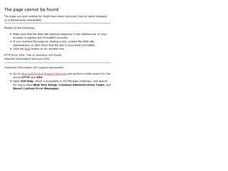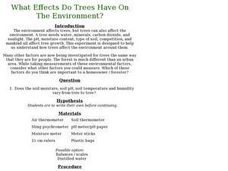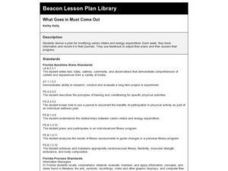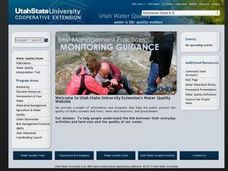Curated OER
Two Ways About It
Students take an imaginary hike in two opposite directions along a lake. They view and interpret satellite images and discuss the pros and cons of hydroelectric dams.
Curated OER
What Effects Do Trees Have On The Environment?
Students examine the interrelationship between trees, soil and people focusing on urban areas. They collect and analyze data about trees in their research area.
Curated OER
Tennis Ball Prints
Learners experiment using abstract art techniques, tennis balls, and tempera paint in this excellent, outdoor art activity for the early-elementary classroom. The resulting art prints can be displayed predominantly in the classroom.
Curated OER
Natural Hazards
Students evaluate the hazards of naturally occurring events. After watching a video concerning safety hazards, students work in groups to discuss the safety issues involved in taking a trip to a mountainous region. Recommendations are...
Curated OER
ESL: Food Vocabulary
In this ESL food vocabulary activity, students circle the food that is described, then translate "food words." A reference web site is given for additional activities.
Curated OER
Piranhas
In this piranhas worksheet, students read information about piranhas and select the correct word or phrases to complete the 15 gaps in the text choosing from multiple choice suggestions. This worksheet is online and interactive.
Curated OER
Statement of Principles
Students examine how Neoclassical art conveyed moral and ethical ideas. They create their own works of art that serve as social commentaries.
Curated OER
Paleogeographic Mapping (o.k. Fossils Are Neat But What Good Are They?)
Learners examine how evidence from fossils can be used in paleogeographic interpretation. They gain experience in developing multiple hypotheses.
Curated OER
What Goes in Must Come Out
Young scholars monitor their calorie intake and energy expenditure. They keep track of daily data in a journal and assess and adjust their diets as appropriate.
Curated OER
Have and Have-Not
Students describe the differences of people living in developed and underdeveloped countries. They also identify how each type of country uses their resources. They develop an ecological footprint of the countries discussed.
Curated OER
Ozone Pollution: Smog Alert
Students simulate the development of smog. They discover how it forms naturally in nature. They read news articles about the ozone and pollution. They discuss what they can do to lower the pollution they generate.
Curated OER
Soybeans in Space
Students work together to design an experiment that compares and contrasts differnet plant cultivation systems. In groups, they evaluate the results of the experiment to discover if the cultivation system could be used in space. They...
Curated OER
Beta-Oxidation of Unsaturated Fatty Acids
Students work in small groups to determine the amount of protein contained in an unknown sample. They conduct the experiment, plot the points of absorbency, and present their findings to the class.
Curated OER
Mobius Band
Tenth graders discuss sides of a shape and how to collect data correctly. In this geometry activity, 10th graders examine shapes and count the surfaces on the shape. They read the history of Mobius Band and relate it to surface area.
Curated OER
Replanting the Rainforest
Students practice problem solving techniques. They interpret data gathered by student researchers in Australia about the effectiveness of various strategies for controlling weed growth in a newly replanted rainforest.
Curated OER
All Aboard!
Young scholars are placed in the position of the person who orders supplies for the ship. They calculate quantities required for a variety of items, and then to convert such quantities into dollars.
Curated OER
Health and Immunization
Students research facts about Niger and Madagascar before reading a child's case study and answering questions about malaria prevention. They discuss healthy lifestyle, how bacteria and viruses can affect health and that following...
Curated OER
Internet Gastropod Research
Use the Internet to research gastropods. Using their textbook, students identify questions by topic they are interested in finding more in depth information. They answer each question and cite at least two internet URLs for each. They...
Curated OER
What Should I Wear Today?
Fourth graders examine weather data for Columbus, Ohio using an Internet resource. They complete a two day and a weekly weather charts before discussing the information. After the discussion, they answer questions about the charts...
Curated OER
That Is Predictable
Students investigate the changes that can take place in an aquatic environment. They conduct research using a variety of resources. The research is used to report different possibilities of change because of abiotic or biotic factors.
Curated OER
Putting on Mass: Just how do Trees grow?
High schoolers articulate an explanation of photosynthesis. They identify problems they have with comprehension of how a plant gains mass. Students describe a historical experiment.
Curated OER
Mallard's Wet Olympics
Students investigate some of the different characteristics of living things. They make observations from reading and interactive media. Students observe that animals move in different ways and have adaptations to aid in that action.
Curated OER
CALORIE COUNTDOWN
Students will categorize foods according to their components and energy content.1. Design a large bulletin board with sections for carbohydrates, fats and proteins.
2. Ask students to bring labels and packages of different food products....
Curated OER
What Do Concentrations Mean?
High schoolers investigate the concept of climate gases and practice using the appropriate measurement terms. The lesson includes information that is used by the teacher to conduct class discussion or as a source of background for students.
Other popular searches
- Water Aerobics Routines
- Aerobics in Water
- Aerobics Water
- Water Aerobics Lesson Plans
- Water Aerobics Arthritis
- Anti Natal Water Aerobics
- Water Aerobics for Seniors
- Deep Water Aerobics
- Deep Water Aerobics Lessons

























